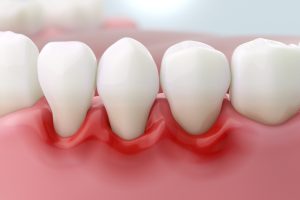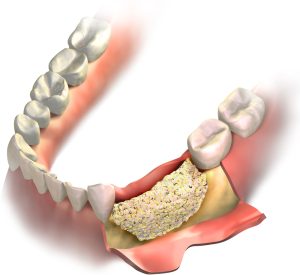Combating Gum Disease: Your Partners at Eggleston Dental Care
At Eggleston Dental Care, we believe that a healthy smile is the cornerstone of overall wellness. Our dedicated team led by Turlock, CA, implant dentist, Dr. Jim Eggleston, understands that gum disease is a common but silent threat that can lead to severe oral health complications if left unchecked.
From cutting-edge non-surgical treatments to advanced periodontal procedures, Dr. Eggleston tailors our approach to meet each patient’s unique needs and goals. We treat gum disease through various methods, including reattaching gums to teeth, reducing swelling, and managing bacterial infections. We’re passionate about providing exceptional care and helping you achieve a vibrant, confident smile, regardless of the oral health challenges you may face.
If you’re concerned about gum disease or want to ensure your gums are in top shape, don’t hesitate to contact our Stanislaus County dental practice. New patients can schedule an appointment by calling 209-226-4963, while our valued current patients can reach us at 209-634-5871.
Gum Disease: What You Need to Know
Gum disease, also known as periodontal disease, is a condition that affects the gums and supporting structures of your teeth. Periodontal disease is primarily caused by the accumulation of bacterial plaque on teeth, leading to inflammation, swelling, and potential infection. If not addressed promptly, gum disease can significantly damage both teeth and gums, potentially leading to tooth loss and other systemic health complications.
Several factors can influence the progression of periodontal disease, including:
- Inconsistent oral hygiene practices
- Tobacco use
- Genetic predisposition
- Hormonal fluctuations
- Certain medications
- Systemic conditions like diabetes
Regular dental check-ups and professional cleanings at Eggleston Dental Care are crucial for early detection and treatment of gum disease.
Risk Factors: Who is Most at Risk?
Gum disease can affect anyone, but certain individuals are more susceptible due to specific risk factors. Understanding these can help you take proactive steps to protect your oral health.
- Smoking: Smoking is a significant risk factor for gum disease. It damages gum tissue and reduces blood flow, making it harder for gums to heal.
- Poor oral hygiene: Inconsistent brushing and flossing can lead to plaque and tartar buildup, increasing the risk of gum disease.
- Genetics: Some people are genetically predisposed to periodontal disease, making them more vulnerable despite good oral hygiene practices.
- Diabetes: High blood sugar levels can damage the gums and supporting tissues, making individuals with diabetes more prone to gum disease.
- Hormonal changes: Fluctuations in hormones during pregnancy, menstruation, or menopause can increase gum sensitivity and the risk of gum disease.
- Medications: Certain medications, such as steroids and some antidepressants, can affect oral health and increase the risk of gum disease.
- Age: The risk of developing gum disease increases with age, making older adults more susceptible.
- Family history: A family history of gum disease can increase your likelihood of developing the condition.
By recognizing these risk factors, you can mitigate them and maintain healthy gums.
Causes of Gum Disease: Understanding the Root
Gum disease, or periodontal disease, primarily stems from the accumulation of plaque and tartar on the teeth. Here’s a closer look at the main causes:
- Plaque: This sticky film of bacteria forms on your teeth, especially in hard-to-reach areas. If not removed through regular brushing and flossing, plaque can harden into tartar.
- Tartar: When plaque isn’t adequately cleaned away, it hardens into tartar, a yellowish deposit that can only be removed by a dental professional.
- Bacteria: The bacteria in plaque and tartar produce toxins that irritate and inflame the gums, leading to infection.
- Poor oral hygiene: Neglecting to brush and floss regularly allows plaque and tartar to build up, increasing the risk of gum disease.
- Diet: A diet high in sugar and acidic foods can contribute to plaque formation and gum disease.
- Hormonal changes: Hormonal fluctuations during pregnancy, menstruation, or menopause can make gums more susceptible to disease.
Understanding these causes can help you take preventive measures to protect your gum health.
Prevention: Protecting Your Smile
Preventing gum disease is all about maintaining good oral hygiene and making regular visits to your dentist. Here are some effective strategies to keep your smile healthy:
- Brush regularly: Brush your teeth at least twice daily with fluoride toothpaste to remove plaque and prevent tartar buildup.
- Floss daily: Flossing once a day helps remove plaque and food particles between your teeth, areas that your toothbrush can’t reach.
- Visit your dentist regularly: Regular dental check-ups and professional cleanings are crucial for early detection and treatment of gum disease.
- Avoid smoking: Smoking can damage your gums and increase the risk of periodontal disease.
- Eat a healthy diet: A balanced diet low in sugar and acidic foods can help prevent gum disease.
- Use an antibacterial mouthwash: An antibacterial mouthwash can help reduce bacteria in your mouth and lower the risk of gum disease.
By incorporating these practices into your daily routine, you can significantly reduce your risk of developing gum disease.
The Journey of Gum Disease: Understanding Its Stages
Gum disease typically progresses through three distinct stages:
- Gingivitis
- Periodontitis
- Advanced Periodontitis
Each stage of periodontal disease requires a different level of intervention, making early detection and treatment vital for preventing further damage.
Gingivitis: The Warning Sign
Gingivitis marks the earliest stage of gum disease. It’s characterized by inflammation and swelling of the gums. Symptoms often include redness, bleeding during brushing or flossing, and gum tenderness. At this stage of periodontal disease, Dr. Eggleston can effectively treat gingivitis through professional dental cleanings and by guiding patients in improving their at-home oral care routines.
Periodontitis: The Turning Point
Periodontitis occurs when inflammation and infection spread beyond the gums to the surrounding tissues and bone. Signs of periodontitis include receding and swollen gums, the formation of deep pockets between teeth and gums, and the onset of bone loss. Treatment at this stage may involve scaling and root planing, targeted antibiotic therapy, and in some cases, surgical intervention.
Advanced Periodontitis: The Critical Stage
Advanced periodontitis represents the most severe form of gum disease. At this stage, the infection has penetrated deep into the tissues and bone. Symptoms include significant bone loss, tooth mobility, and severe gum recession. Treatment options for advanced periodontitis may include gum grafting, bone regeneration procedures, and in some cases, tooth extraction.
Recognizing the Signs: Symptoms of Periodontal Disease
While it’s possible to have periodontal disease without obvious symptoms, here are some warning signs to watch for:
- Gums that bleed easily during brushing or flossing
- Red, swollen, or tender gums
- Gum recession, where gums pull away from teeth
- Persistent bad breath or an unpleasant taste in the mouth
- Presence of pus between teeth and gums
- Loose or separating teeth
- Changes in your bite or the fit of partial dentures
If you’re experiencing any of these symptoms, we urge you to contact Eggleston Dental Care promptly. Early intervention is key to preventing permanent periodontal disease complications such as tooth loss.
Complications of Untreated Gum Disease: The Hidden Dangers
Ignoring gum disease can lead to severe complications that affect not only your oral health but also your overall well-being. Here are some hidden dangers of untreated gum disease:
- Tooth loss: As gum disease progresses, it can cause teeth to become loose and eventually fall out.
- Bone loss: The infection can deteriorate the bone that supports your teeth, leading to further oral health issues.
- Systemic diseases: Research has linked gum disease to systemic conditions such as heart disease, diabetes, and respiratory disease.
- Bad breath: Persistent bad breath, or halitosis, can result from the bacteria associated with gum disease, affecting your confidence and social interactions.
- Tender gums: Gum disease can cause your gums to become tender and painful, making it difficult to eat and speak comfortably.
- Receding gums: As the gums recede, the roots of your teeth become exposed, increasing the risk of tooth decay and sensitivity.
Addressing gum disease early can prevent these complications and help you maintain a healthy, confident smile.
Your Path to Healthy Gums: Periodontal Disease Treatment Options
At Eggleston Dental Care, we offer a comprehensive range of treatment options for periodontal disease:
- Professional Dental Cleanings: Our skilled hygienists use advanced tools to remove plaque and tartar, promoting gum health.
- Scaling and Root Planing: This deep cleaning procedure targets plaque and bacteria below the gum line, addressing periodontitis and preventing further damage.
- Laser Periodontal Therapy: We utilize state-of-the-art laser technology for minimally invasive treatment, promoting faster healing with less discomfort.
- Bone and Gum Grafting: For cases of advanced gum disease, we offer bone grafting and gum grafting procedures to restore lost bone and gum tissue.
- Antibiotic Therapy: Targeted antibiotics can help control bacterial infection and reduce inflammation.
- Surgical Interventions: In severe cases, Dr. Eggleston may recommend surgical options to restore gum health and save affected teeth.
To learn more about our treatment options and how you can prevent gum disease, call our Turlock dental practice today.
Investing in Your Smile: Understanding the Costs of Gum Disease Treatment
The cost of treating gum disease can vary widely, typically ranging from $1,700 to $8,000, depending on the severity of the condition. More advanced stages of gum disease generally require more extensive treatment, which can increase costs. At Eggleston Dental Care, we’re committed to providing transparent pricing and working with patients to find the most effective and affordable treatment options.

